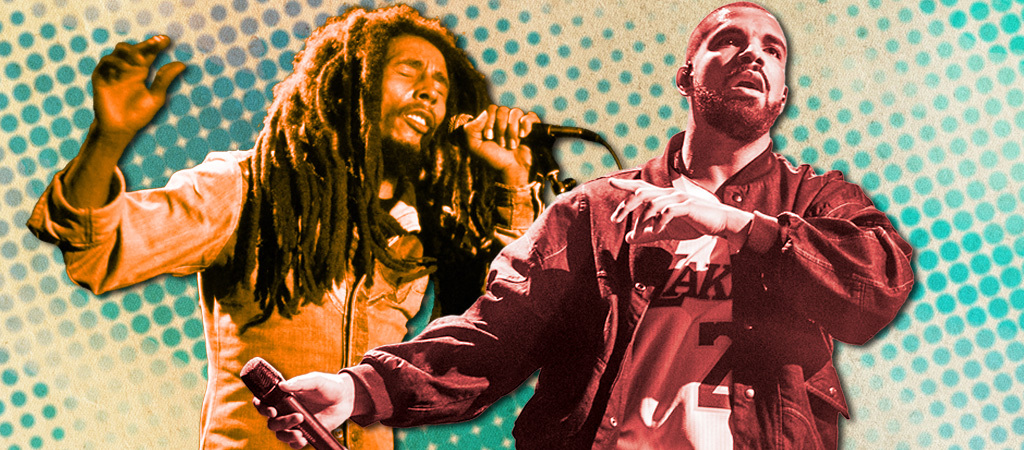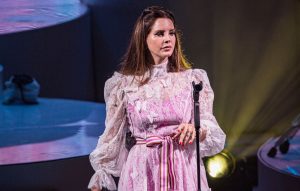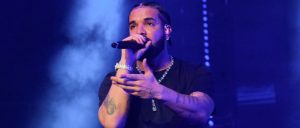Getty Image/Merle Cooper
Without question, Jamaica’s greatest export is reggae music, as embodied by the genre icon Bob Marley. Even if you’ve never had the fortune to visit the Caribbean country, Marley’s influence can be felt around the globe. Regardless of the genre, the late musician’s groundbreaking discography is the undercurrent for some of the world’s biggest acts, including Burna Boy, Bruno Mars, Janelle Monáe, Nas, Stevie Wonder, and The Police.
In Paramount Pictures’ biopic Bob Marley: One Love, starring Kingsley Ben-Adir (as Bob Marley) and Lashana Lynch (as Rita Marley), audiences are reminded of Marley’s musical greatness. However, the overlooked takeaway from the film is the cultural significance of reggae music. Born out of multiple diasporic sounds (mainly ska, rocksteady, and calypso), its mento (folk) core is what curated the art form into a calling card specific to the people of Jamaica.
As was the case for hip-hop, reggae’s rise had everything to do with its alluring instrumentation as well as the profoundly political and social commentary heard throughout each record’s lyrics. Somewhere along the way, that rebel spirit has been lost (or at least on the mainstream front). So, how did the genre go from Bob Marley And The Wailers’ 1977 version of “One Love” to Drake’s “One Dance” in 2016? Similar to the music itself, the answer to this question is quite layered. The decentering of religious obligations, commodification of Jamaican culture, and leniency of gatekeepers have all contributed to the erasure of reggae music’s social & political commentary roots.
First, you must examine Marley, the man and musician, to dissect why he’s revered around the globe. The person behind those poetic pieces was a spiritually rich man far before his tangible wealth set in. In journalist Vivien Goldman’s 2006 The Book Of Exodus, she recounted one of her many conversations with Marley before his death, where he detailed his faith journey into Rastafarianism. Having a vision of Jah (God) in 1966 while living in America prompted him to return to Jamaica “with a clear vision” of his life’s purpose. Marley’s unwavering tether to his religious obligations led him to inherit the moral responsibilities of a messenger.
Reggae or, as he referred to it, “the king’s music” (quoted by Timothy White in his 1983 biography, Catch A Fire: The Life Of Bob Marley), each time Marley touched a microphone, his duties were to lead his people toward’s God favor pushing back against the wickedness in the world. With Dancehall being the dominant sound coming out of Jamaica presently, long gone are the days when reggae acts could break through for simply speaking truth to power. To borrow a line from the 1993 film Menace II Society, ‘Don’t nobody wanna hear that sh*t, Sharif.’ Well, unless you count Koffee (the youngest musician to win a Grammy in the reggae category). That’s not to say that rising stars Byron Messia, Jada Kingdom, or Dexta Daps don’t sprinkle spirituality into their music. It’s just not their primary focus. Nor does it pick up steam outside the country’s parishes in days past.
The commodification of Jamaican culture has played the most significant role in the erasure of reggae music’s social & political commentary roots. Globalization is a b*tch. As quickly as Marley’s music traveled, so did the industry’s urge to convert this newly found popularity into a steady income stream. From labels’ rush to extract reggae’s musicality (native instruments, production techniques, etc.) to companies’ mass production of “Rasta-inspired” tchotchkes, an influx of items hit the market to give those obsessed with the country’s superstars a piece of Jamaica on-demand.
We’re not talking just about the white tourist wearing tams with faux dreadlocks (zatavi) crocheted into them. Most certainly, it includes non-natives cosplaying cultural ambiguity. This ushers in the music industry question equivalent of whether Black folks can or can not be racist. So, can Black people appropriate other sectors of Black culture? When you boil it down to semantics, the answer is no. But are Black people (including bi-racial or multi-racial) often seen exploiting Caribbean cultures in stereotypical ways? The answer is, without a shadow of a doubt, yes. Is reggae music a monolith? No. But it’s okay to admit that we’re losing the plot.
Rihanna’s 2005 “If It’s Lovin’ That You Want” to 2009 “Rude Boy” pipeline isn’t precisely how reggae music was intended to evolve, but does that mean it should be stripped from the rolling credits? Drake’s “One Dance” is inspired by reggae music. This development is a game of telephone set to music where the subject matter drastically changes, and the instrumentation refuses to give in to eroding. What happens when the money means more than the message? I don’t know. Ask hip-hop.
Its gatekeepers were the last line of defense in reggae music to retain its social & political commentary roots. Unfortunately, their leniency inadvertently contributed to the genre’s now dull bite. When talking about music families, there’s no one above the Marleys in reggae. Starting with the paternal figures to the children and now grandchildren (hi, Skip), several generations of the Marley bloodline carry the torch both in the booth and label boardrooms. Other key players, including producers, songwriters, DJs, and more, continually fuel the genre’s progression on the ground in Jamaica.
Still, as far back as the 1990s, the barrier enforced based on socioeconomic upbringing nearly pushed Sean Paul out of music. In a 2022 documentary with Vice, Paul confessed that during the early days of his career, he desperately wanted to make “cultural records” that spoke to the economic and living conditions of Jamaica’s ghettos harkening to reggae’s foundation. However, producer Jeremy Harding (one of the most impactful music professionals in reggae) advised against it. “[Harding] was like, ‘You know nobody believes you. You know that, right? You’re not the person that will be able to ‘preach.’ So, why don’t you sing about who you are… sing about girls. Sing about parties.’”
Ultimately, Paul’s success doing so helped kick off Dancehall’s international resurgence in 2000 (so thanks for that). Still, now the public is left to fantasize about what artist Paul could’ve been if given the space to craft the art he originally intended. In the same video piece, Harding shed further insight into the divide in Jamaica on who can be the vocal authority in reggae.
“As I started to work with Sean, we realized that we shared a similar background — the way that we describe it, we were Uptown kids,” he said. “So, the friends and family that we had around us were looking at us strangely. Like, ‘Why do you want to get involved with Dancehall? Dancehall is nasty, dutty, ghetto music?’ And at the same time, you’re struggling against the other side of the community, saying, ‘Oh, you shouldn’t be here because you don’t have a place in this music’ and ‘You’re not from the ghetto; therefore, you are not authentic.’”
“Everyone was challenging [me], [saying] ‘You can’t express for us,’” added Paul.
Yet, that same protective energy disappeared when given the breakout moment to promote Bob Marley: One Love during the 2024 Grammys; Ziggy Marley laughed along as host Trevor Noah poked fun at the Jamaican accent and many of their easygoing personalities instead of focusing on the richness of the culture.
Too high: @ZiggyMarley with #GRAMMYs2024 host @Trevornoah and “Bob Marley: One Love” star Kingsley Ben-Adir pic.twitter.com/V31NbnxTJG
— CelebStoner (@CelebStoner) February 5, 2024
What good are gatekeepers if they aren’t keeping the culture when it matters the most? You tell me. Are Afrobeats and amapiano tastemakers taking heed?
Where do we go from here? Nowhere. As with hip-hop, the damage is already done. A complete gutting would have to take place to undo what has been done, which economic players likely won’t let happen. In short, Bob Marley: One Love is a painstaking reminder of what was and how the decentering of religious obligations, commodification of Jamaican culture, and leniency of gatekeepers have all contributed to the erasure of reggae music’s social & political commentary roots.
Some artists covered here are Warner Music artists. Uproxx is an independent subsidiary of Warner Music Group.




